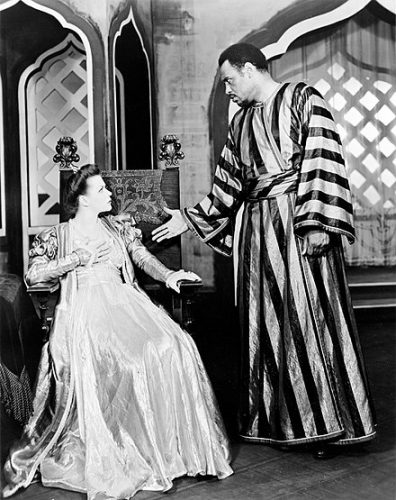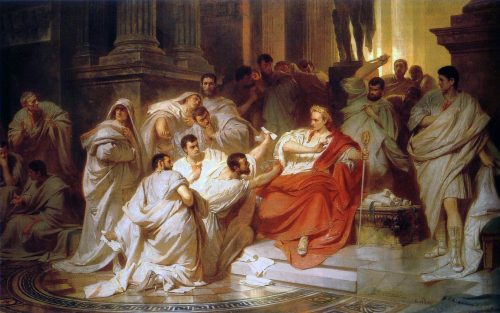 Shakespeare’s most cunning villain turns sleep and dreaming against his enemies.
Shakespeare’s most cunning villain turns sleep and dreaming against his enemies.
At the center of Shakespeare’s dark tragedy is the cruel dynamic between Othello, a magnificent warrior and heroic leader, and Iago, his resentful subordinate. (In the current production at the Oregon Shakespeare Festival, Chris Butler performs in the title role, and Iago is played by Danforth Comins). Despite being a dark-skinned Moor, Othello has earned the trust of the white Christians of Venice because of his military valor and success in defending their city. But Iago secretly hates Othello, and he launches a devilish plan to ruin, humiliate, and destroy him, all while pretending to be Othello’s most faithful servant. A subtle weapon in Iago’s arsenal is his malicious manipulation of people’s perceptions of sleep, beds, and dreaming.
The play opens with an overwrought gentleman, Roderigo, furiously accusing Iago of betrayal. Roderigo is in love with Desdemona (played in the OSF production by Alejandra Escalante), a Senator’s daughter, and he has been paying Iago for help in wooing her. Now comes the shocking news that Desdemona has already married Othello, and Roderigo demands to know how Iago could have let this happen. These are Iago’s first words of the play:
“’Sblood, but you’ll not hear me. If ever I did dream of such a matter, abhor me.” (I.i.4-5)
Iago tells Roderigo his suspicions are no more credible than the fleeting whimsies of a dream. He relies on a kind of proverbial phrasing that equates dreams with something as far as possible from the conscious mind. He’s telling Roderigo: Not only did I not know about this, but it was not even in the furthest reaches of my awareness.
In fact, Iago did know about it, and he may well have dreamed about it, too (more on that below). He already knows about Desdemona, and he already has a plan for using her against the Moor. While he and Roderigo have been talking about their mutual hatred of Othello, Iago has been steering them through the dark nighttime streets of Venice, straight to the home of Desdemona and her family. Their yelling brings Brabantio, Desdemona’s father, to the window. Prodded by Iago, Roderigo informs the Senator that his daughter has secretly married Othello (Iago puts it in more inflammatory terms: “your daughter and the Moor are now making the beast with two backs” (I.i.115-116)). Brabantio urgently calls for all the servants of his house to awaken, light candles, and search for his daughter. For a moment he pauses to reflect:
“This accident is not unlike my dream, belief of it oppresses me already.” (I.i.141-142)
Iago slinks into the night before Brabantio confirms that Desdemona is missing, but his dastardly work is done. Brabantio has awakened to his worst fear—the dishonoring of his daughter—and Iago has insured that all his paternalistic rage will be aimed straight at Othello.
It seems unlikely that Iago knew Brabantio was dreaming right before he awoke, but it certainly works to the villain’s advantage. In a way, Iago both creates Brabantio’s dream and interprets it. If he and Roderigo had not caused a noisy uproar, Brabantio would have kept sleeping, and might not have remembered this dream at all. Once Brabantio is awake, if he had not been immediately confronted with the shocking news of his daughter’s betrayal, he might have associated the dream with something else in his life. Although he seems slightly ambivalent about the dream’s relevance to the situation with his daughter (they are “not unlike”), it takes no time for the two to become fused emotionally in his mind (“it oppresses me already”). This is just as Iago would want. Iago has manipulated Brabantio into using the energies of his dreams to fuel his vendetta against Othello.
From Brabantio’s perspective, everything in the play turns out just as badly as he feared it would. In that regard, his dream could be regarded as an accurate prophecy of the doomed future. Even though he’s wrong about Desdemona’s virtue and integrity, he’s right about the danger to her posed by the Moor. Iago is the interpretive agent of this realization, and he turns Brabantio’s insight into a weapon aimed straight at Othello’s heart.
Alas, the shot has no effect. Brabantio cannot persuade the leaders of Venice to act against Othello, given their overriding need of his military protection, plus Desdemona’s sincere declarations of love for him.
Thus Iago must devise a new plan to destroy Othello. In the final lines of Act I Iago is onstage alone, pondering the question “How? How?” In a burst of malevolent inspiration, he envisions an intricate plot using people’s fears and biases against them, all leading to a single violent end. Iago revels in his own nightmarish brilliance:
“I have’t, it is engend’red: Hell and Night must bring this monstrous birth to the world’s light.” (I.iii.410-411)
Later, just before a key piece of action begins, Iago refers again to the nocturnal provenance of his plan:
“But here they come: if consequence do but approve my dream, my boat sails freely, both with wind and stream.” (II.iii.61-62)
He likens his scheme to a prophetic dream that predicts the future. At one level this is quite ironic, since Iago is anything but superstitious. His behavior reflects a pure form of willful, defiant individualism; he is determined to create his own chosen future, not wait passively for his fate.
But at another level this comment appears as an honest self-recognition of his unusual powers of imagination. Iago’s “dream” is a detailed prediction about what will happen if certain people’s emotions are stimulated in specific ways and channeled towards certain other people. He has set this dream in motion, and he can accurately foresee where it will lead. He knows that Othello’s downfall will begin with the destruction of his sleep:
“Not Poppy, nor Mandragora, nor all the drowsy syrups of the world, shall ever medicine thee to that sweet sleep which thou ow’dst yesterday.” (III.iii.320-323)
While he steals the sweet sleep of Othello, Iago adds bitter falsehoods to the sleep of the Moor’s top military assistant, Cassio. To persuade Othello that Cassio has illicit desires for Desdemona, Iago tells the following story:
“I lay with Cassio lately, and being troubled with a raging tooth, I could not sleep. There are a kind of men so loose of soul that in their sleeps will mutter their affairs: one of this kind is Cassio. In sleep I heard him say, ‘Sweet Desdemona, let us be wary, let us hide our loves.’ And then, Sir, would he gripe, and wring my hand, cry ‘Oh sweet creature,’ and then kiss me hard, as if he pluck’d up kisses by the roots that grew upon my lips; laid his leg o’er my thigh, and sigh’d and kiss’d, and then cried, ‘Cursed fate, that gave thee to the Moor.’” (III.iii.403-415)
This story serves Iago’s cause in several ways. Because of the nature of the circumstances (it’s night, they’re asleep), it cannot be checked or verified. It appears to be a special, unguarded insight into Cassio’s true character, and it fits with other clues Iago has laid before the Moor. It allows Iago to insert the most blatantly sexual and jealousy-stimulating images into Othello’s mind, but from a source that can easily be dismissed as trivial and foolish. Indeed, Iago bolsters his own credibility when he feigns skepticism about the waking-world significance of Cassio’s strange sleeping behavior:
“Nay, this was but his dream.” (III.iii.416)
As Iago intends, Othello replies by insisting that he shall decide for himself what to think about Cassio:
“But this denoted a foregone conclusion: ‘tis a shrewd doubt, though it be but a dream.” (III.iii.417-418)
From here, Iago immediately pivots to the topic of the precious handkerchief that Othello gave as a present to Desdemona, and that Iago has stolen and is about to plant in Cassio’s possession. Iago thereby weaves together “proofs” from various sources, each one small in itself but together forming a larger pattern of meaning, a pattern that, unbeknownst to Othello, has been predetermined to drive him mad. The mighty warrior is no match for his malevolent servant’s interpretive reasoning.
For the most part, Iago acts as a mere assistant, letting Othello feel like he is in charge of determining what his wife has been doing and how he should respond. But at one crucial moment Iago gives the Moor a shocking directive. Othello has just decided he must kill Desdemona for her infidelity, and he asks Iago to get him some poison. Iago replies:
“Do it not with poison, strangle her in her bed, even the bed she hath contaminated.” (IV.i.214-215)
Iago makes this horrifying proposal because he knows that Othello’s rage is also mixed with sadness (“but yet the pity of it, Iago”) and might distract him from carrying out his deadly intentions. By demanding that he kill Desdemona in their marital bed, Iago helps Othello perceive it as a heroic act with an epic meaning, a violent but noble triumph in the cause of restoring moral order to the universe. Othello replies:
“Good, good, the justice of it pleases; very good.” (IV.i.216)
Iago has persuaded Othello to think of murdering his wife in their bed as pleasing, as “good, good… very good.” This line is chilling testimony to Iago’s success in warping Othello’s soul.
This is the same bed that Desdemona, just a few scenes earlier, has playfully described as a “school” where she hopes to teach her husband about empathy and compassion for others (III.iii.24). She is planning to devote herself to expanding his emotional self-awareness, but she never gets the chance. The bed where she wants to cultivate their relationship in new directions becomes the place where he, in a single-minded rage, will destroy it.
Othello likes to think of himself in larger-than-life terms, as a legendary hero bursting forth from a realm of mythic dreams. Desdemona loves him for his adventurous spirit, but she is also trying to temper his warrior instincts and bring out a fuller human being. Iago, however, feeds his grandiosity, stokes his reflexive aggression, and encourages his naïve assumptions. Othello, the proud and courageous veteran of so many fearsome battles, chooses, at this decisive moment in his life, to follow the easier, cowardly path. Death and destruction for all is the result.


 Prophetic dreams of doom go unheeded in Shakespeare’s tragedy about violent political strife among the greatest leaders of ancient Rome.
Prophetic dreams of doom go unheeded in Shakespeare’s tragedy about violent political strife among the greatest leaders of ancient Rome.